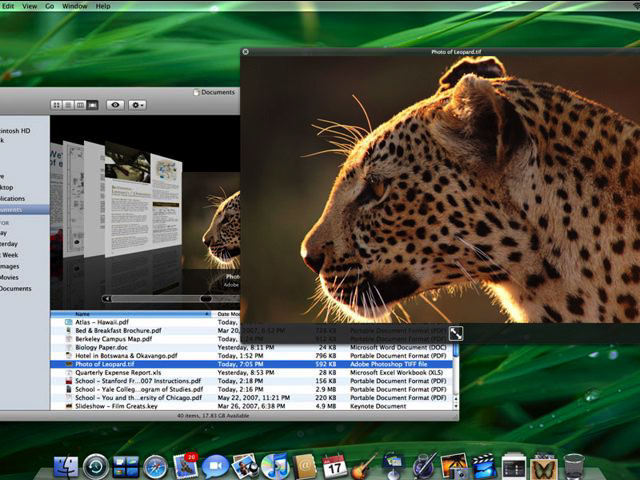Jefferson Graham
USA Today

Oct. 17- Jefferson Graham discusses Apple’s operating system Leopard with analyst Mike McGuire.
LOS ANGELES — A Leopard is set to join the Apple family, the latest in a string of animal-named products aimed at taking a bite out of the competition.
Apple calls Mac OS X Leopard its biggest operating system upgrade ever. At $129, it’s due in stores Oct. 26 and promises 300 new features.
Leopard, which replaces OS X Tiger, arrives as Apple is having a record year. Its stock has doubled in 2007, from about $85 a share in early January to nearly $170 now.
It has sold more than 1 million iPhones, the year’s most hyped and discussed tech product. And Apple’s iPod business remains strong. New iPod units recently introduced include a video-capable Nano, a small media player that is the most popular in the line.
While much of Apple’s attention has been focused on non-computer activities, Leopard is aimed at a core goal: selling more Macintosh computers. The new operating system has loads of new stylistic bells and whistles, with two notables:
•Time Machine automatically backs up files without your involvement and lets you “turn back time” to retrieve a lost file. It’s different from other backup utilities in that with “a couple of setup clicks, you’re done,” says Apple Senior Vice President Phil Schiller. “Everything is automatic from there.”
•Boot Camp gives you the ability to run Windows on a Mac. All you need to do is buy a copy of Windows software, and you can run both platforms on one machine.
Boot Camp was introduced in early 2006 as beta software that could be accessed from Apple’s website. Apple says it was downloaded 2 million times.
With the release of Leopard, the software will no longer be available as a free download. At any rate, Wolf Bytes analyst Charles Wolf says the broader audience of 100 million shoppers who frequent Apple retail stores will pay closer attention to an operating system feature than a download.
“Most Apple Store visitors are Windows users, and once they see how they can use Windows on a Mac, so many more will be switching,” says Wolf.
Apple’s computer market share is 3% worldwide and 7.8% for the non-business U.S. market, says Roger Kay, an analyst at Endpoint Technologies. “Market share is clearly increasing for Apple. It’s up 50% from the 2% Apple had from 2000 to 2004.”
Kay thinks the idea of millions of Windows computer users switching to Apple with the Leopard release is just not about to happen. “You have to buy Windows, install it and hope it works,” he says. “That’s a cumbersome process.”
Buying Windows XP or Vista will tack $200 onto the price of the Apple computer.
Microsoft launched Vista in February, the latest overhaul of its operating system. It offers advanced multimedia capabilities and improved security but has left some consumers grumbling over upgrade and software incompatibility woes.
Mike McGuire, an analyst at researcher Gartner, says those kinds of issues are rare with Apple operating system upgrades.
“Vista was a whole new platform, while the Mac OS X platform was first rolled out in 2001,” says McGuire. “It’s been revived and enhanced since, but it shares the same core platform, so I don’t expect any upgrade issues.”
While Microsoft says Vista is doing just fine — about 60 million copies have been sold — several computer manufacturers are now offering the previous Windows version, XP, to consumers who prefer it.
“Apple has a real chance to play off Vista unsatisfaction,” says Kay.
The forecast
Analyst Gene Munster at Piper Jaffray doesn’t expect Leopard to have much of an impact on future earnings.
He sees it generating $250 million in revenue for the holiday quarter. Compared with his estimates of $6 billion in total revenue for the September quarter and $8.5 billion for the holiday quarter, he calls Leopard “just a drop in the bucket.”
Still, while iPods and the iPhone have gotten most of the attention, Apple’s computer business is humming. Wolf estimates that when it announces earnings next week, Apple will report more revenue from Macs than iPods.
Apple’s fiscal year ended on Sept. 30. Wolf projects a 30% increase in Mac unit sales to 6.8 million for the year. His revenue projections for the year: $10 billion for computers, vs. $8.3 billion for iPods.
In 2006, iPods outsold Macs, $7.6 billion to $7.3 billion.
Apple’s Schiller says that two-thirds of Apple’s 22 million registered users upgraded to Tiger after it was released.

